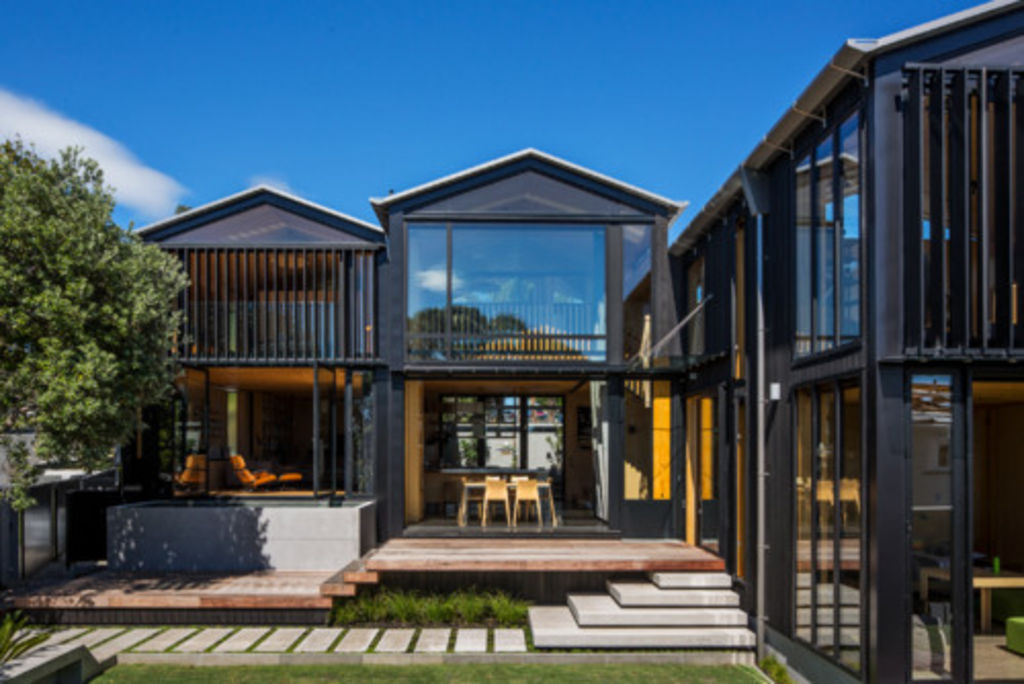Everything you need to know before you hire an architect
By
HouzzMarch 15, 2017

Author: Rebecca Naughtin
Obtaining fee proposals from multiple architects can be a great way to get a better understanding of what is possible for your new project, but it is often difficult to understand what you are paying for and how to compare fee structures. Architects can offer many different fee structures, so how do you know if you are getting the best value for money?
Let’s explore the potential services of an architect, the possible fee structures available, and the questions you should ask in your preliminary interview to ensure smooth sailing ahead.

- Do you need a feasibility study, and how much it will cost?
Architects need as much information as possible to help you, and the first thing you must do before speaking with any design professional is get clear on what accommodation you need, how much you are willing to spend on your project, and when you need it to be completed by.
Often, these three items are not set in concrete. You may want to know what you can achieve for a certain budget, for example, so discuss this during initial interviews with architects. They may suggest completing a feasibility study prior to launching into the concept design stage. The feasibility study will give you a rough budget guide based on past work, or square metre rates depending on the complexity of each space. Planning, site and building complexities should be factored into this study.
Make sure you are aware of any additional fees that may be involved in your project, and be clear when you discuss budget that it includes things such as appliances, blinds, landscaping, and any applicable consultant fees. We find our clients prefer a fixed fee for a feasibility study; it gives them a “mud map” without committing to full services, but some architects will include this in their first stages of work.
- How many design options can you choose from?
The initial design stage is known as “concept design”. During this stage the architect will provide you with a number of designs in either hand-drawn or digital format. Generally, three options in plan format will be provided. Basic cardboard models may be made during this stage to assist in the design process.
You should allow approximately 15 per cent of the total fee for this stage, however, this can vary depending on the type of architect you are interviewing. An award-winning design architect may front-load their fee to give them plenty of freedom to design. When interviewing an architect, ask how many design iterations are included in their fee for this stage. Do they keep designing until they “get it right”? Or does the fee revert to an hourly rate after a number of revisions?

- Do they have experience with the complexities of your site?
Whether it’s green field sites with new homes proposed, or alterations to homes within a heritage overlay, some architects specialise in particular areas, or can easily adapt with each challenge presented to them. Are you willing to give an architect a go if they don’t have experience in a certain area of specialisation?
Don’t rule them out if they don’t have experience, but ask if they have a mentor, or what their stance is on restoration/site analysis. This is a tactic that some emerging practices use to procure work, giving you confidence that they have a good network for guidance.
What Makes an Ideal Client? Architects Tell All

- Do your design principles align?
This is where Houzz is so great! During your initial meeting, show off a small sample of favourite projects you’ve saved into a Houzz Ideabook, or share it with your architect beforehand. It will become very clear whether the architect you are interviewing is capable of designing for your aesthetic needs.
Images also help the architect understand the level of finish that you want for your home, and how adventurous you may be. It is often the best gauge for initial budget discussions: “You want marble kitchen benchtops? OK, this is a high-end kitchen.”

- Are planning or development approval fees included?
All sites require some kind of approval, whether it be through a planning process or during the building permit approval stage. This approval will be made directly through the local authority, or done by your building surveyor.
Architects can prepare all of the relevant information for these approvals. For sites with overlays being assessed for siting through council, you will require an accompanying report and application form. Does this fall into the architect’s main fee, is it extra, or do they prefer to outsource to another consultant?
If lumped into the main fee, make sure that you are aware of any potential additional costs associated with negotiating with the council after lodgement of the application. We prefer to charge a flat rate for any dispensations, should there be any required. These should be identified in the concept design stage, so you can better control your fee budget.
If the negotiation goes to a higher authority, say the Victorian Civil Administration Tribunal (for those in Victoria), you may have to pay an hourly rate for representation.
- What level of detail do you need on technical drawings?
Architects’ services include contract documentation, which is normally the bulk of their fee, as it is the most time consuming portion of work. This stage involves the technical documentation required to obtain accurate quotes from builders, and to obtain a building permit.
The form of this fee may be a percentage of cost of construction (excluding GST) – where the percentage is based on how much information you need as a minimum for permits – plus the option for 1:20 or 1:50 interior elevations, full electrical plans including data points and switch heights, and reflected ceiling plans showing bulkheads and cooling vents.
To give you an example, drawings done on a 1:20 scale will give you an idea about which drawer has been designated for your tea towels; those on a 1:50 scale will help you and your builder understand the proportions of a room and where drawers and cupboards should be allowed. The different scales and information provided may not be necessary for each project, especially when you are being budget conscious. High-end projects usually have more detail, but you may be happy with the amount of information on a 1:50 drawing. Ask to see some examples of this work to help you understand what you need, with the option of changing the scale.
This stage normally includes the preliminary preparation of the contract you may be using for your build, as well as Schedules for Finishes and Selections, and a written specification.
- Who selects the finishes?
Some architects have a particular style and a range of often-used fittings and fixtures come with that style. This can be great as your architect will already have these options laid out for you, saving you time in making selections. But if hitting the road on a shopping adventure is your way of making your mark, ask your architect if this will affect their fee.
Some architects will include a percentage fee on the supply of your appliances and fittings, others a service fee, and still others charge hourly fees to download the relevant information. There may also be a charge to transfer the selection information into a schedule. Just be clear on who is doing what, and ask for an estimate for each option.
Worthwhile Questions to Ask an Architect at the First Meeting
- Does your architect have go-to builders?
You may already have your own builder, which can be a great relief for you as you already trust someone to build your future home. However, architects should also have their own contacts. Ask how many builders the architect has on his or her preferred builders’ list. And ask up front about any issues they may have on site with this builder. Problems are normal; it’s how the architect and builder resolve the issues that is key. This is a great way to get an understanding of the architect and builder’s negotiation skills.
Tendering to multiple builders can be a good way to get the best value, but are you comparing apples with apples? Ask your architect if these preferred builders are happy to walk you through one of their projects.
This stage can be charged under the Contract Administration Stage fee, a lump sum fee, or hourly, depending on if you are negotiating with one builder, or tendering to multiple, which can be a more time-consuming process. Make sure you get some kind of gauge on what process the architect prefers for your project.

- Will your architect monitor the building works?
The contract administration stage involves the administration of the contract between you and the builder. This includes monitoring works for quality, budget and making sure the project is completed within the given timeframe.
Don’t be fooled into thinking this is supervision of the works. I have personally found this stage the most difficult in providing a fixed fee, as some builders or clients need a lot of guidance, some less. More recently we have undertaken this work at an hourly rate, with an estimate of the time required per month. Otherwise a percentage-based fee, or even a fixed per week/month fee, can be negotiated.
When interviewing, ask what benefits there are to using an architect during this stage, and how that particular architect can make a difference. Architects are trained in protecting their clients from financial risk at this stage, but there may be other benefits. Sometimes their fees outweigh the stress you may be exposed to during the build.
Share:
We thought you might like
States
Capital Cities
Capital Cities - Rentals
Popular Areas
Allhomes
More
Allhomes acknowledges the Ngunnawal people, traditional custodians of the lands where Allhomes is situated. We wish to acknowledge and respect their continuing culture and the contribution they make to the life of Canberra and the region. We also acknowledge all other First Nations Peoples on whose lands we work.
"With open hearts and minds, together we grow." artwork by David Williams of Gilimbaa.







